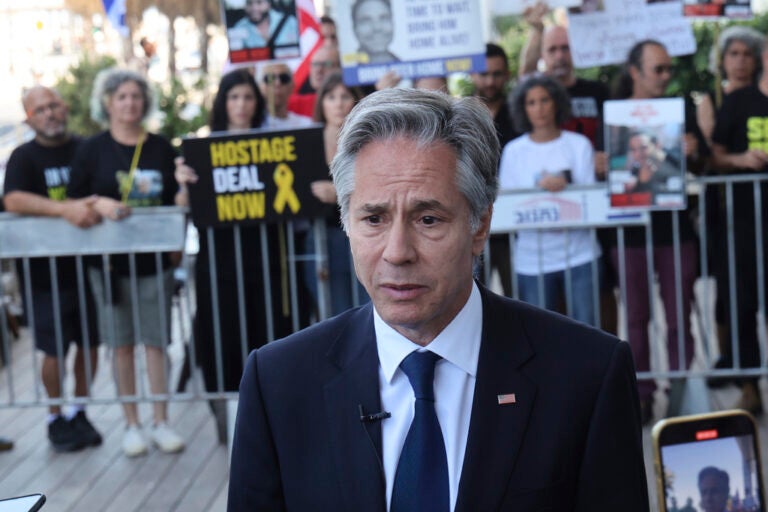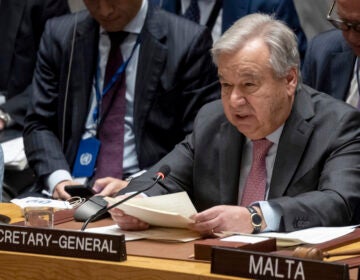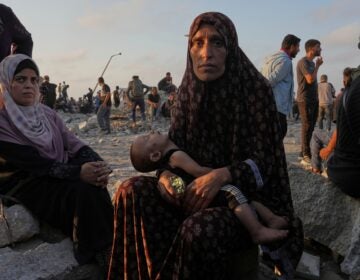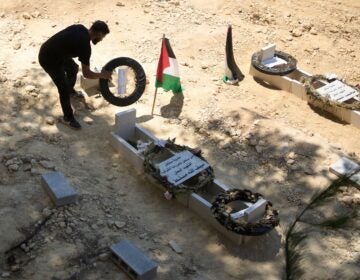Hamas responds to Gaza cease-fire plan seeking some changes. U.S. says it’s ‘evaluating’ the reply
Hamas says it has given Qatari and Egyptian mediators its reply to the U.S.-backed proposal for a cease-fire in Gaza, seeking some “amendments” on the deal.

U.S. Secretary of State Antony Blinken speaks to the media as after meeting with families and supporters of Israelis held hostage by Hamas in Gaza, during his visit to Tel Aviv, Israel, Tuesday, June 11, 2024. (Jack Guez, Pool Photo via AP)
Hamas said Tuesday that it gave mediators its reply to the U.S.-backed proposal for a cease-fire in Gaza, seeking some “amendments” on the deal. It appeared the reply was short of an outright acceptance that the United States has been pushing for but kept negotiations alive over an elusive halt to the eight-month war.
The foreign ministries of Qatar and Egypt — who have been key mediators alongside the United States — confirmed that they had received Hamas’ response and said mediators were studying it.
“We’re in receipt of this reply that Hamas delivered to Qatar and to Egypt, and we are evaluating it right now,” White House national security spokesman John Kirby told reporters in Washington.
Hamas spokesman Jihad Taha said the response included “amendments that confirm the cease-fire, withdrawal, reconstruction and (prisoner) exchange.” Taha did not elaborate.
But while supporting the broad outlines of the deal, Hamas officials have expressed wariness over whether Israel would implement its terms, particularly provisions for an eventual permanent end to fighting and full Israeli withdrawal from Gaza in return for the release of all hostages held by the militants.
Even as the U.S. has said Israel accepted the proposal, Israeli Prime Minister Benjamin Netanyahu has given conflicting signals, saying Israel will not stop until its its goal of destroying Hamas is achieved.
U.S. Secretary of State Antony Blinken has been in the region this week trying to push through the deal — his eighth visit since Hamas’ Oct. 7 attack on southern Israel ignited Israel’s campaign in Gaza. On Tuesday, he continued pressure on Hamas to accept the proposal, saying that the U.N. Security Council’s vote in its favor made it “as clear as it possibly could be” that the world supports the plan.
“Everyone’s vote is in, except for one vote, and that’s Hamas,” Blinken told reporters in Tel Aviv after meeting with Israeli officials, hours before Hamas announced its reply. He said Netanyahu had reaffirmed his commitment to the proposal when they met late Monday.
In a joint statement announcing that they had submitted their reply to Qatar and Egypt, Hamas and the smaller Islamic Jihad militant group said they were ready to “deal positively to arrive at an agreement” and that their priority is to bring a “complete stop” to the war. A senior Hamas official, Osama Hamdan, told Lebanon’s Al-Mayadeen television that the group had “submitted some remarks on the proposal to the mediators,” without elaborating.
The proposal has raised hopes of ending an 8-month conflict in which Israel’s bombardment and ground offensives in Gaza have killed over 37,000 Palestinians, according to Palestinian health officials, and driven some 80% of the population of 2.3 million from their homes. Israeli restrictions and ongoing fighting have hindered efforts to bring humanitarian aid to the isolated coastal enclave, fueling widespread hunger.
Israel launched its campaign, vowing to eliminate Hamas, after the group and other militants stormed into Israel on Oct. 7, killing some 1,200 people, mostly civilians, and taking around 250 hostage. Over 100 hostages were released during a weeklong cease-fire last year in exchange for Palestinians imprisoned by Israel.
Later Tuesday, Blinken attended a Gaza aid conference in Jordan, where he announced over $400 million in additional aid for Palestinians in Gaza and the wider region, bringing the total U.S. assistance to more than $674 million over the past eight months.
U.N. Secretary-General António Guterres told the gathering that the amount of aid flowing to the United Nations in Gaza for distribution has plummeted by two-thirds since Israel launched an offensive in the territory’s southern city of Rafah in early May.
Guterres called for all border crossings to be opened, saying, “the speed and scale of the carnage and killing in Gaza” is beyond anything he has since he took the helm of the U.N. in 2017.
In a separate development, the U.N. human rights office said Israeli forces and Palestinian militants may have committed war crimes during the deadly Israeli raid that rescued four hostages over the weekend. At least 274 Palestinians were killed in the operation, according to Gaza’s Health Ministry.
Blinken, who was in Cairo on Monday, was also expected to visit Qatar — where talks would likely focus on the next steps in the push for a deal.
On Monday, the U.N. Security Council voted overwhelmingly to approve the proposal, with 14 of the 15 members voting in favor and Russia abstaining. The resolution calls on Israel and Hamas “to fully implement its terms without delay and without condition.”
The proposal, announced by President Joe Biden last month, calls for a three-phased plan that would begin with an initial six-week cease-fire and the release of some hostages in exchange for Palestinian prisoners. Israeli forces would withdraw from populated areas and Palestinian civilians would be allowed to return to their homes. Hamas is still holding around 120 hostages, a third of whom are believed to be dead.
Phase one also requires the safe distribution of humanitarian assistance “at scale throughout the Gaza Strip,” which Biden said would lead to 600 trucks of aid entering Gaza every day.
At the same time, negotiations would be launched over the second phase, which is to bring “a permanent end to hostilities, in exchange for the release of all other hostages still in Gaza, and a full withdrawal of Israeli forces from Gaza.”
Phase three would launch “a major multi-year reconstruction plan for Gaza and the return of the remains of any deceased hostages still in Gaza to their families.”
The militant group embraced a similar proposal last month that was rejected by Israel.
Biden presented it as an Israeli proposal, but Netanyahu has publicly disputed key aspects of it, saying there were parts left out by Biden. The conflicting signals appear to reflect Netanyahu’s political dilemma. His far-right coalition allies have rejected the proposal and have threatened to bring down his government if he ends the war without destroying Hamas.
A lasting cease-fire and the withdrawal of Israeli forces from Gaza would likely allow Hamas to retain control of the territory and rebuild its military capabilities.
But Netanyahu is also under mounting pressure to accept a deal to bring the hostages back. Thousands of Israelis, including families of the hostages, have demonstrated in favor of the U.S.-backed plan.
The transition from the first to the second phase appears to be a sticking point. Hamas wants assurances that Israel will not resume the war, and Israel wants to ensure that protracted negotiations over the second phase do not prolong the cease-fire indefinitely while leaving hostages in captivity.
Blinken said the proposal would bring an immediate cease-fire and commit the parties to negotiate an enduring one. “The cease-fire that would take place immediately would remain in place, which is manifestly good for for everyone. And then we’ll have to see,” Blinken said.
___
Sewell reported from Beirut.

Get daily updates from WHYY News!
WHYY is your source for fact-based, in-depth journalism and information. As a nonprofit organization, we rely on financial support from readers like you. Please give today.





